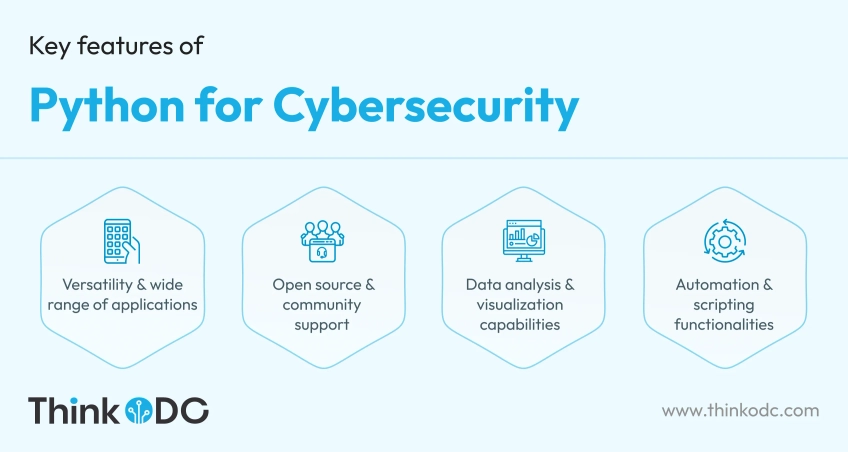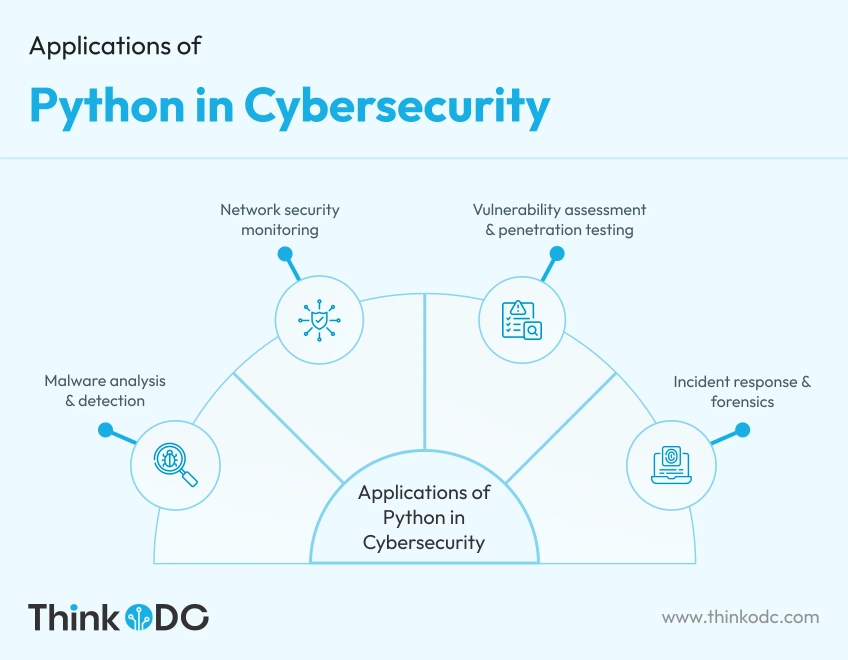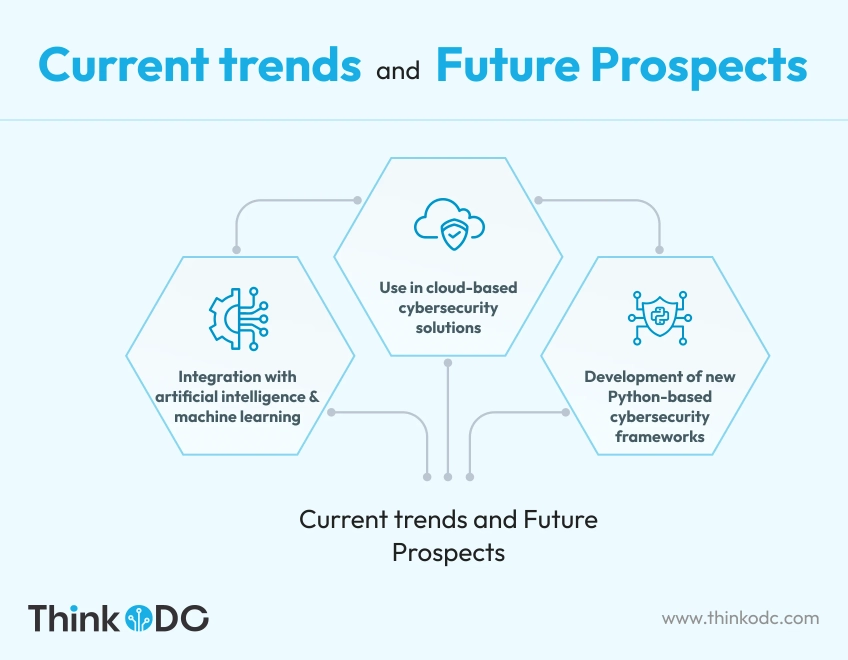As technology continues to advance, cybersecurity is becoming increasingly important in our digital lives and for organizations around the world.
In 2024 and beyond, leveraging the right tools will be key to addressing growing cyber threats. That's where Python comes in - it is emerging as one of the most versatile and widely used programming languages for cybersecurity applications.
Note: According to the United States Cybersecurity Institute (USCS), Python will be the most popular programming language in 2024. With 49.29% user share, this highly versatile language dominates the cybersecurity world.
In this blog, we'll explain why Python is so useful for cybersecurity professionals and what some of its main applications are. We'll also outline some key trends in how Python is enhancing cybersecurity strategies.
By the end, you'll understand why python for cybersecurity deserves a prominent place in your toolkit.
So let's get started!
Key Features of Python for Cybersecurity
Python works so well for security due to certain inherent characteristics:

Versatility and wide range of applications
Python can be used for everything from Python web development to data science and system administration. This is thanks to its simple yet powerful core syntax which remains the same across applications. Whether you want to scrape logs, build an API, analyze network captures or automate tasks, Python offers the building blocks.
It integrates well with other programming languages and environments too. So for dedicated Python web developers and security teams handling diverse tasks, it provides a single platform to address almost any need.
Open source and extensive community support
Being open source means Python is constantly improved and expanded through community collaboration on platforms like GitHub. This ensures it stays relevant with new features. Its extensive user base also means security issues are quickly addressed.
Most importantly, its large community actively develops and shares pre-built Python modules, libraries and tools — saving costly development efforts. Security practitioners can directly benefit from these shared resources to build custom solutions.
Data analysis and visualization capabilities
Python ships with multiple libraries like NumPy, Pandas, Matplotlib and Seaborn for efficiently handling large datasets. Tasks like loading, cleaning, aggregating and exploring security data become very simple.
Its data visualization libraries help translate raw data into informative, interactive visual formats. For security contexts requiring insights from logs, IoT feeds or network metadata, Python empowers analysts through these powerful data manipulation features.
Automation and scripting functionalities
Python's simple yet robust scripting abilities allow automating repetitive cybersecurity workflows. Tasks like scanning for vulnerabilities, monitoring endpoints, generating reports that were previously time-consuming can now run with a single Python command.
Its modular approach also helps split complex automation into reusable sections of code. This multiplied productivity boosts efficiency of security operations teams through round-the-clock automation. Consistent and fail-proof execution of standard processes further improves overall security posture.
As you can see, Python delivers the core functional foundations highly valued in cyber roles ranging from individual analysts to large enterprises.
Applications of Python in Cybersecurity

Python's vast potential in security stems from its wide range of practical applications, including:
Malware analysis and detection
Python supports dynamic malware analysis using tools like Cuckoo Sandbox that automate malware submission and retrieval of analyzed results. It allows interactive static analysis in disassemblers like Binary Ninja.
Frameworks like Plyara parse PE files to extract metadata, strings and other artifacts for further research. Yara rules can also be written in Python for malware hunting and detection. All these capabilities make Python an important weapon in analysts' arsenal against evolving malware.
Network security monitoring
Python integrates with network traffic monitoring and security information tools like Bro, Security Onion, Zeek, Snort and Wireshark for collecting logs, building scripts to detect suspicious patterns over wire data and consolidating alerts.
Solutions like Splunk, ELK stack and Graylog deployed via Python further help correlate data for comprehensive network visibility and threat hunting.
Vulnerability assessment and penetration testing
Popular frameworks like Metasploit, scapy and nmap are primarily coded in Python, giving it a powerful role in evaluating target security posture. Reconnaissance, info gathering and manual exploitation attempts can all be automated into scalable Python scripts.
Tools like Flask, Django then help create customized web interfaces or reports. Python also enables red-teamers to deliver payloads and pivot within compromised systems.
Incident response and forensics
Memory and disk analysis utilities volatility, Rekall Forensic, dumpdecrypt, Binwalk heavily rely on Python APIs to extract evidentiary artifacts for timeline reconstruction.
Triage of compromised hosts is expedited using Python scripting along with ELK for hunting related activity across an infrastructure. Python also assists in automating containment and remediation procedures post-investigation.
Python permeates the entire spectrum of proactive and reactive security functions thanks to its adaptability. This strengthens the case for organizations learning and leveraging this versatile language.
Benefits of Using Python for Cybersecurity

The power of python in cyber security tasks provides organizations with several advantages:
Enhanced efficiency and productivity
By automating repetitive tasks like scanning, patching or report generation, mean time to resolution is vastly improved. This allows reallocating resources to higher priority initiatives.
Automation also ensures tasks run smoothly without human errors or delays. Teams can monitor larger environments more actively by spending less time on routine chores.
Improved accuracy and reliability
Python excels at parsing logs, packet capture analysis and visualization of complex security data relationships. This equips analysts with evidence-backed insights instead of weak hunches.
Automated validation and testing further reduce false positives or negatives from detection solutions. Auditing is standardized with Python scripts enforcing consistent best practices organization-wide.
Cost-effectiveness and scalability
Leveraging open source Python-based tools incurs low license fees. Developing custom in-house automation pays off the upfront costs quickly through long-term efficiency.
Python automation for cybersecurity also helps optimize existing tool investments. Python allows security controls to scale on demand based on dynamic workloads and threat levels. This matches spending precisely as per need without over-provisioning.
Access to a vast ecosystem of tools and resources
From pre-built frameworks for APIs, web apps, analytics to special modules, Python developers enjoy massive support through extensive documentation and online resources.
Security teams can assess options before selecting the best tool or library, avoiding unnecessary development efforts. Sharing code over various Python resources shortens solution deployments.
Python delivers a compelling return on investment for security programs through multiplicative advantages of its automation, analytics and ecosystem. This serves as a force multiplier for teams to achieve more with the same or fewer resources.
Trends and Future Prospects
Python expertise for cybersecurity dominance will only grow in the coming years as new trends and integrations broaden its capabilities even more.

Integration with artificial intelligence and machine learning
Python powers top AI/ML frameworks like TensorFlow and PyTorch. We'll see its security role expand here with more self-learning IDSes, automated threat hunters, anomaly detection and predictive analytics. Attack simulations can also leverage ML to continuously improve strategy based on past outcomes.
Use in cloud-based cybersecurity solutions
As workloads transition online, Python will enhance security via cloud APIs, SDKs and continuous delivery/deployment pipelines. Expect more Python code securing serverless computing, monitoring multi-cloud environments, automating cloud security configurations at scale using tools like Ansible, Terraform etc.
Read More: Find out how to build a machine learning team with Python
Development of new Python-based cybersecurity frameworks
Promising new Python frameworks like Mordor, Praqma and STIX will attract developers and integrate other specialized tools into unified CLIs, GUIs or marketplaces.
Such open security platforms could offer modular capabilities for tasks like threat intel sharing, red team exercises, Blue Team workflows, IR playbooks and forensic investigations.
We'll also see increased Python adoption across security orchestration, identity management using frameworks like Ansible Tower, Argo, and Terraform. As 5G and IoT explode, network access control solutions may dominate using Python scripts for zero-touch provisioning, device authentication and traffic inspection at edge.
In the future, Python will get only more ingrained in all cyber processes through innovation in adjacent fields. Its simple design ensures smoothly integrating benefits of newer disruptive tech for security teams.
Conclusion
Python has established itself as one of the most powerful and multi-purpose programming languages for cybersecurity. With its versatile syntax, extensive libraries, open source model and automation capabilities, Python delivers enhanced efficiency, accuracy, scalability and cost-effectiveness for security operations.
As technologies like AI/ML, cloud and IoT continue to evolve, Python will remain integral for leveraging new capabilities via its extensive ecosystem. Organizations should increasingly focus on Python-based tools to combat future risks.
Adopting Python for your next project can future-proof their security programs and help maintain robust cyber defenses.
ThinkODC: Your partner in protecting against today's cyber threats.
Hiring dedicated Python developers from ThinkODC can help strengthen your defense using this powerful programming language.
Our team of Python experts have extensive experience developing custom security solutions across various domains. Whether you need security automation scripts, analytic dashboards, threat monitoring systems or vulnerability assessment tools - our Python developers have the skills to design and implement robust yet scalable code.
ThinkODC can extend your in-house capabilities cost-effectively through our talent rental and project-based engagement models. Contact us today to fortify your defenses against evolving cyber dangers using Python dexterity.





